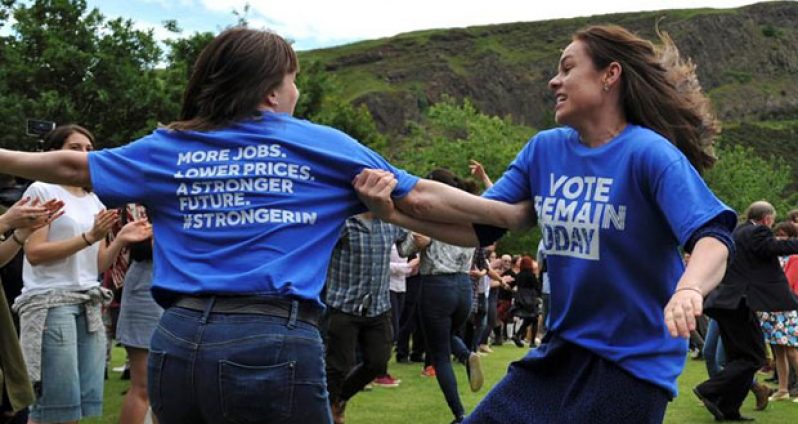(Reuters) British Prime Minister David Cameron and his eurosceptic opponents made final pitches for wavering voters on Wednesday on the eve of a defining referendum on European Union membership with the outcome still too close to call.The vote, which echoes the rise of populism elsewhere in Europe and the United States, will shape the continent’s future. A victory for “out” could unleash turmoil on financial markets and foreign exchange bureaus reported a surge in demand for foreign currency from Britons wary sterling may fall.
“It’s very close; nobody knows what’s going to happen,” Cameron told Wednesday’s Financial Times, with opinion polls showing the rival camps neck and neck.
The Leave camp was on 45 percent, just one point ahead of Remain, with 9 percent undecided, in the last poll published by Opinium, which called it a “statistical tie”.
Leave had a two-point advantage in a separate poll by research firm TNS, down from seven points in a previous TNS survey on June 14. TNS said the lead could evaporate on polling day, as in past referendums in Scotland and Quebec.
European Commission chief Jean-Claude Juncker warned there would be no further renegotiation whatever the result on Thursday, after EU leaders reached a deal on a new settlement for Britain in February.
French President Francois Hollande said a vote to leave could seriously jeopardize British access to the EU’s prized single market. German Chancellor Angela Merkel said she did not want to speculate on what dangers would arise if Britain left, because she wanted it to stay in the Union.
The referendum will take place a week after the murder of ardently pro-EU lawmaker Jo Cox shocked the country, raising questions about the tone of an increasingly bitter four-month campaign.
Much of the debate has boiled down to two issues: the economy and immigration.
The City of London financial center, the International Monetary Fund and the majority of British business leaders back Cameron and his Remain camp’s stance that to leave the EU would plunge Britain into recession, costing jobs and raising prices.
Supporters of a so-called Brexit have struck a chord with many voters by saying Britain would regain control of immigration if it cut itself loose from a bloc they see as domineering and out of touch.
In what has become an ugly and personal fight, both camps have been accused of using unfounded assertions and scare tactics. Remain campaigners accuse their opponents of resorting to the politics of hate; the Leave camp say their rivals have run a “Project Fear” to scare voters about the economic risks.
Both sides hit the road and the airwaves to appeal to the large number of undecided voters who will be decisive, along with the level of turnout.
“It’s our last chance to sort this out and take back control,” said former London mayor Boris Johnson, the main leader of the Leave campaign and favorite with bookmakers to replace Cameron in the event of Brexit.
“If we don’t vote to leave tomorrow we will remain locked in the back of the car, driven in an uncertain direction frankly to a place we don’t want to go and perhaps by a driver who doesn’t speak the very best of English,” he said.
He was flying around Britain in a helicopter to spread the Brexit message, making an unashamed play to British patriotism by declaring Thursday could be “independence day”.
On eve of defining British EU referendum, rivals race for final votes
SHARE THIS ARTICLE :
Facebook
Twitter
WhatsApp



.jpg)









